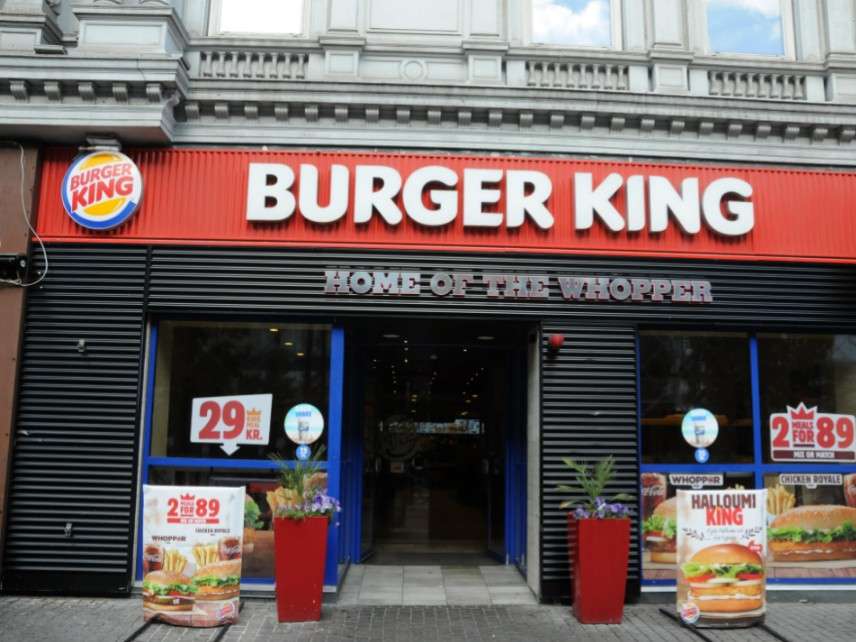Despite Advocates' Wishes, Parents Still Buying Fast Food for Kids
They're lovin it

A new report from the Rudd Center for Food Policy and Obesity, released last month, claims that parents are buying more fast food for their kids than ever before. Worse still, say the study's authors, parents are turning a blind eye to so-called healthier choices that are now available at many of those fast food outlets and sticking with tried-and-true junk food choices.
The study is based on a survey of roughly 800 parents with one or more children aged 2-11. It reveals some surprising findings. For example, it found at least one in three parents buy food for their kids at Burger King, KFC, McDonald's, or Subway at least once each week. It also found that more than 90 percent of parents bought their kids a meal at one of those four restaurants during the past week. And it found that just five percent of parents never buy their kids food from McDonald's.
Jennifer Harris, director of marketing initiatives with the Rudd Center, told CBS News that "fast food companies have come under a lot of pressure from public health advocates to improve the nutrition quality of their products, especially kids' meals" and that "[t]hey have responded by offering healthier side options in kids meals."
But the study authors also suggest the promise of these healthier options is helping lure parents into restaurants, only for them to continue to choose less healthy options once there.
For years, advocates have urged fast food restaurants to carry healthier options, particularly in kids' meals. For example, the Robert Wood Johnson Foundation, which funded the new Rudd Center study, urged fast food companies, in a 2013 study of its own, to "increase the proportion of lower-calorie, healthier items on their menus and make them available at a reasonable price."
"It's always nice when a restaurant offers a few things on their menu that aren't fried," the Rudd Center's own Marlene Schwartz, told the Connecticut Post in 2011. ("Schwartz said it's uncertain that kids will pick the healthy items as long as the unhealthy items are still there," the paper also noted.)
Fast food consumption by children is up despite the aforementioned moves by many fast food restaurants in recent years to offer putatively healthier choices for kids.
Notably, many of these same advocates have also supported legislative efforts to crack down on fast food choices available to parents buying meals for kids. It appears most of these efforts have failed or backfired, and have given rise to their share of unintended consequences.
Restaurant menu labeling was supposed to drive consumers, parents especially, to make healthier choices in fast food restaurants. It hasn't. Just the opposite. Los Angeles famously (and really, really disastrously) banned new fast food restaurants in South Los Angeles. San Francisco's Happy Meal Ban was an immediate bust, as McDonald's simply offered their Happy Meal toys for a small additional price. Others have followed. One of the interesting points I noted in the new Rudd report, for example, is that Burger King now offers "a dessert in place of a kids' meal toy." What's that, government and advocates? Offering free toys with a high-calorie kids' meal purchase is bad? Fine. We'll just give them some more calories instead. Delicious.
Other nefarious proposals haven't gotten off the launch pad. Austin considered banning fast food restaurants near places where kids congregate. And after researchers claimed fast food logos brainwash kids, some called for such marketing to be banned forthwith.
The Rudd study embraces these sorts of government interventions. For example, it suggests fast food restaurants should make healthier choices the default and endorses government measures, such as those in places like Baltimore, that mandate this practice.
I surmise these laws will continue not to achieve their goals. Nevertheless, fast food restaurants are still restauranting, responding to evolving consumer demands by implementing changes of their own—including some that kids' meal critics will cheer. For example, McDonald's announced earlier this year that it was making changes to its Happy Meals that will remove calories, sodium, and sugar from the kids' menu items. That's the sort of change we should applaud.
